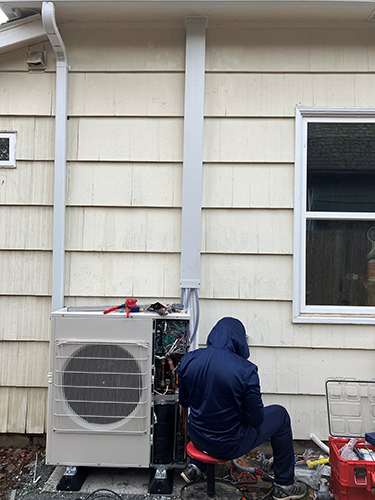|
Subscribe / Renew |
|
|
Contact Us |
|
| ► Subscribe to our Free Weekly Newsletter | |
| home | Welcome, sign in or click here to subscribe. | login |
Construction
| |
 |
March 28, 2024
Eastside cities partner for climate action
Eastside Climate Partnership

Vynne McKinstry
|
Even as impacts from climate change in the Pacific Northwest grow more visible by the day, communities are stepping up their commitments to a more sustainable future. Cities and counties across Washington are developing and implementing commitments to reduce greenhouse gas emissions, and prepare for the inevitable impacts of climate change. These plans include dozens, if not hundreds, of actions that need to be taken over the next few years to keep our communities on track to meet greenhouse gas emission reduction targets.
Community members and elected officials have set expectations around implementation, with ambitious timelines for action, and regular data reporting on progress towards targets. In addition, substantial local investment is needed to make meaningful emission reductions to avoid the worst climate impacts, and build resilience for the impacts already projected to affect our region.
For many jurisdictions, a single individual or small team is charged with developing climate action programs and policies while also tracking progress on implementation results.
A few years ago, five cities on the eastside of Lake Washington began partnering on specific climate initiatives, from community engagement to home electrification. These cities initially began working on climate action and advocacy as active members of the King County Cities Climate Collaborative (K4C) in 2011.
POOLING RESOURCES
Over the years, the Eastside cities realized that there was synergy in working closely together to more quickly implement climate action, mitigation and resilience measures. The shared interest in collaboration grew into the formal relationship of the Eastside Climate Partnership (ECP), which includes the founding members of the cities of Bellevue, Kirkland, Issaquah, Mercer Island and Redmond. After successfully working together on multiple climate initiatives, the ECP was formalized in 2023 through an Interlocal Agreement signed by the respective mayors and city managers.
The partnership builds on successful collaboration between our cities on economic development initiatives, human services programs, water infrastructure, affordable housing, transit planning and more.
Through the partnership, small sustainability offices can leverage pooled resources, reduce duplication of efforts and accelerate climate action. Our approach includes specific efficiencies such as hiring shared staff, developing joint grant applications, coordinated marketing, and sharing the load for contract management. This innovative partnership model allows the five cities to collectively grow our climate programs, while keeping program administration at a minimum, to achieve more ambitious and impactful climate action at the regional scale.
To date, the ECP has accomplished the following:
Secured over $1.5 million in state grants to support our initiatives to reduce emissions from fossil fuels through home electrification.
Launched the Energy Smart Eastside heat pump program, providing a regional and national model for a coordinated heat pump installation program across multiple jurisdictions. The program has installed over 100 heat pumps for households with low and moderate incomes, while also providing incentives for households at any income level. Our heat pump program reduces reliance on fossil fuel heating sources, increases home comfort, and provides cooling during extreme heat events.
Educated over 300 building owners and property managers on state building energy efficiency standards. The clean building programs provide access to free services such as assessing energy usage compared with standards and submitting required reports, as well as support for securing incentive funds. Improvements made in the participating buildings will lead to cleaner buildings through improved energy efficiency and reduced reliance on fossil fuels.
Launched the Eastside Climate Challenge, which has committed over 800 eastside households to actions that will reduce carbon dioxide emissions by 170 tons, which is the equivalent of taking 38 gasoline powered passenger vehicles off the road. This program provides an opportunity for community members to track their own actions and engage their neighbors in support of progress towards regional climate goals.
Jointly prepared greenhouse gas emissions inventories for our communities and municipal operations. Over time, these inventories track where emissions reduction progress has been made (or not) and provide guidance for where to focus climate action efforts in the future.
These actions and accomplishments highlight how the partnership of five Eastside cities has a greater impact than a single jurisdiction could alone. We are sharing our success around the region and country to help other jurisdictions reconsider their approach, and identify if similar partnerships are possible.
Climate action and sustainability is a priority for our community members and city councils, which allows the ECP to focus on how to achieve our goals in a more impactful way. Looking ahead, the ECP has already identified areas to expand our ability to continue to foster resilient, healthy, and sustainable communities. Climate change remains a critical issue, but when communities make it a priority to address and when innovative approaches like the Eastside Climate Partnership are developed, we can make strides to significantly cut our emissions and help our communities become more resilient to potential impacts.
Primary author Stacy Vynne McKinstry is the sustainability manager for the city of Issaquah. Contributing Authors: David Barnes is a senior planner and sustainability manager for the city of Kirkland. Alanna DeRogatis is the sustainability program analyst for the city of Mercer Island. Jennifer Ewing is the sustainability manager for the city of Bellevue. Jenny Lybeck is the environmental sustainability program manager for the city of Redmond.
Other Stories:
- Centering equity, reconciliation and community in coastal adaptation
- Reclaiming our shores
- Five environmental factors influencing construction in 2024
- Buried treasure: harnessing waste heat for a cleaner future
- Floating wetlands strengthen urban ecosystems and community engagement
- A park for all people — and the environment
- Planning for a rainy day, every day



